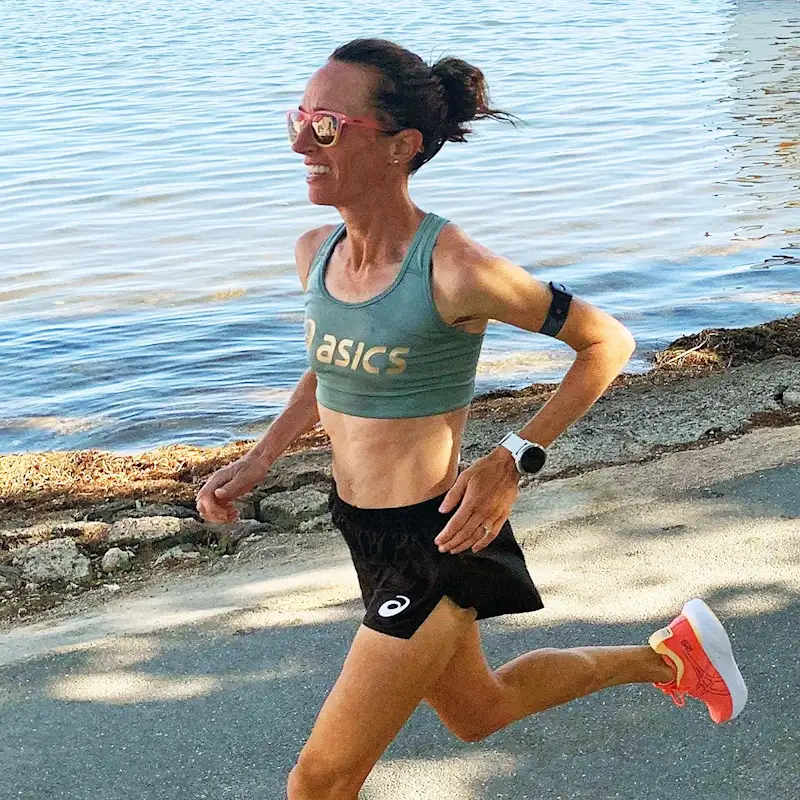
Lisa Weightman
Osaka Marathon
Lisa's headline numbers
Lisa's strategy
Fueling
Carbohydrate is the main fuel you burn when racing. Failing to fuel properly is a leading cause of underperformance in longer races.
Lisa used a combination of PF Carb Only Drink Mix and PF 30 Gels to fuel her through to a third-place finish in Osaka. Lisa felt her energy drop toward the end of the run, indicating she could’ve done with adding more carbohydrate to her fueling strategy. The fact her average carb intake was slightly below the recommendation for a marathon race of this duration and high intensity supports this. Only a small amount of carb was delivered through the drink mix because she didn’t consume much fluid in these conditions, so carrying one or two more PF 30 Gels would do the trick. She did attempt to prefuel with half a gel in the final 30 minutes before the race start, to spike her blood glucose levels, though taking the full amount might be helpful in the future.
Hydration
Taking on board an appropriate amount of fluid and sodium is essential to maintaining blood volume and supporting the cardiovascular effort needed to perform on race day.
Whilst the absolute amount of sodium and fluid consumed per hour is important, it’s critical to consider these in relation to each other. This is known as 'relative sodium concentration' and it’s expressed in milligrams per litre (mg/L). How much sodium you’re taking in per litre of fluid is more important than the absolute amount taken in per hour.
Sweat sodium concentration (mg/L) is largely genetically determined and remains relatively stable. Knowing how salty your sweat is enables you to replace a good proportion of your sweat losses, which can range from 200-2,000mg/L.
Whilst Lisa’s losses are on the low side, getting her hydration strategy right is still important if she wants to perform at her best.
Learn moreBetween the colder weather and rain, Lisa’s fluid intake was understandably on the lower end, though still appropriate for the conditions. She’s also not a very salty sweater, so her total sweat losses (fluid plus sodium) likely would’ve mounted up enough to cause any issues, and she didn't have any cramping during the race. Though she took on some sodium beforehand, she could preload with a higher strength of electrolyte drink to match the recommendations in an attempt to boost her blood plasma volume ahead of sweating, and then for warmer races, add a lower strength into her race-day fluid to mitigate potential problems.
Caffeine
Beyond the Three Levers of Performance (carb, sodium and fluid), caffeine is one of only a few substances that is proven to improve performance for most endurance athletes as it can help stave off mental and physical fatigue.
Lisa took half a PF 30 Caffeine Gel around 30km (18.6 miles), though she may not have reaped the full benefits, as caffeine takes ~45-60 minutes to peak in the bloodstream. Her intake also fell below the recommendations of 3-6 mg per kg bodyweight. Going forward, she could take a full caffeine gel earlier in the race to get ahead of any dropping energy levels, as well as contribute to her overall carb intake.
How Lisa hit her numbers
Here's everything that Lisa ate and drank on the day...
Lisa's weapons of choice
Final thoughts
Lisa's full stats
Data Confidence?
There is an adequate level of accuracy in the data collected and the numbers reported. The athlete manages to recall what they ate and drank including most specifics (brands flavours quantities plausible estimations of volumes). However there are estimations made within the data which affect the overall confidence level in the data reported.